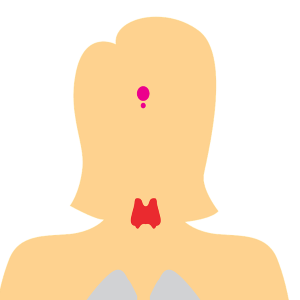Hypothyroidism and Endometriosis
The thyroid gland plays a key role in gynecological diseases. It is not uncommon for women with endometriosis to have a malfunction of the butterfly organ. Real-life examples show that hormonal abnormalities can lead to discrepancies in the female cycle and promote infertility. I would like to go on the trail of hypothyroidism with you today. Let’s discover together what connection there is between hypothyroidism and endometriosis and whether this has implications for endometriosis therapy.
How thyroid hormones affect the menstrual cycle.
The thyroid gland is a hormonal gland located in the front of the neck. It is often called the butterfly organ because the lateral lobes resemble butterfly wings. The organ affects your metabolism and performs important regulatory functions in the body. [1] This includes interfering with the female cycle and reproduction. Medical experts repeatedly observe that even slight deviations in thyroid activity can cause profound disturbances in the menstrual cycle. Fertility can also be reduced as a result. Finally, not only can the menstrual cycle be disturbed by hypothyroidism, but also the maturation of eggs. [2]
The following thyroid hormones exist:
- Triiodothyronine (thyroxine or T3).
- Tetraiodothyronine (T4)
Hypothyroidism and endometriosis: is there a connection?

The thyroid gland is also called the butterfly organ.
The US Endometriosis Association states that individuals with endometriosis are six times more likely to have hypothyroidism.[3] Although this assumption suggests a clear link, not much is yet known about the connection between thyroid disease and endometriosis. This is because a complex interplay must first be explored. Scientists have already looked into this and discovered the first exciting interactions.
- Thyroid hormones influence cell growth and the condition of the endometrium. [4,5,6]
- Various antibodies (defense substances) can be detected in the blood of selected endometriosis patients, including those against the endometrium. Although endometriosis is not an autoimmune disease, parallels can be seen. For example, the disease also affects the immune system. There are also autoimmune diseases with regard to the thyroid gland. These include Hashimoto’s thyroiditis or Graves’ disease. [7,8]
- Endometriosis lesions may respond differently to thyroid hormones circulating in the body. Researchers found that the lesions have different thyroid metabolism. This may lead to a reduction in the effect of the thyroid hormone T3, which in turn may lead to an accumulation of T4. Potentially, this could lead to increased growth of endometriosis tissue.[9]
Beware of confusion: symptoms of hypothyroidism and endometriosis
Although hypothyroidism and endometriosis are completely different diseases, the symptoms are quite similar. Therefore, it is important to distinguish the symptoms with great care during the diagnosis.
The following symptoms are similar or can occur in both diseases: [10]
- Menstrual cramps (cycle-dependent bleeding disorders or pain).
- Constipation
- Fatigue (severe tiredness, lack of energy)
- depressed mood
- fertility problems
- poor sleep quality
- tingling, numbness or pain, for example in the legs
Of course, hypothyroidism has additional symptoms, such as enlargement of the thyroid gland, increased sensitivity to cold, and weight gain.
Special case: Hashimoto’s thyroiditis
Hypothyroidism is caused in about 90% of cases by a so-called Hashimoto’s thyroiditis. This is an autoimmune disease that causes the organism to produce defensive substances against the thyroid components. This is a devastating mechanism, because it causes the butterfly organ to become inflamed – hypothyroidism occurs. Hashimoto’s thyroiditis is by no means rare. In fact, 4.6% of all individuals now have a mild form and do not notice it. [11,12] But where is the link between the autoimmune disease and endometriosis? I checked the studies for you and came across an interesting fact. For example, there are observations that infertile women are significantly more likely to have thyroid autoimmune disease. The difference was particularly marked in women with endometriosis and polycystic ovarian syndrome.[13]
Why this is so is still the subject of research.
Good to know!
When endometriosis is present, so-called estrogen dominance can often be observed. This means that too many female sex hormones such as estrone and estradiol are present. At the same time, there is usually a progesterone deficiency or progesterone resistance, whereby the existing progesterone cannot develop its full effect. Hashimoto’s thyroid disease is also frequently associated with a progesterone deficiency. Both endometriosis and hypothyroidism are treated with preparations that affect progesterone levels.[14,15]
Keep an eye on thyroid levels in endometriosis.
In the case of hypothyroidism, too little thyroid hormone is produced. This can have a decisive effect on fertility. Since women with endometriosis also often struggle with an unfulfilled desire to have children, the additional presence of hypothyroidism could further reduce the chances of having offspring. The good news is that hypothyroidism can be treated. The missing thyroid hormone, T3, can be replaced with a medication. However, it takes about three months for hormone levels to be balanced. Treatment may be needed in phases or for life, depending on the cause. Nervous conditions may occur as a side effect. This is usually the case if the dosage is too high. When administering thyroid medication, it is therefore absolutely necessary to check the values regularly (about once a year, more frequently at the beginning) and if necessary to adjust the dosage.
Short and on the point
Thyroid hormones undeniably have an important influence on the female cycle and fertility. Studies suggest that they may also play a crucial role in endometriosis. For example, thyroid hormones can influence cell growth and endometrial health. In addition, endometriosis lesions were shown to have different thyroid metabolism, which could potentially cause endometriosis tissue to grow more. In particular, Hashimoto’s thyroiditis, an autoimmune disease of the thyroid gland, causes hypofunction of the butterfly organ. Like endometriosis, it is associated with progesterone deficiency. In many cases, the administration of progesterone also improves the thyroid levels. [14] In the case of endometriosis, the administration of progestin is the drug of choice.[16] The sex hormone progesterone comes from the group of progestins and can be administered in synthetic form.
The various facts reveal exciting parallels between hypothyroidism and endometriosis, which will need to be explored in more detail in future studies.
References
- Foundation for Quality and Efficiency in Health Care Wie funktioniert die Schilddrüse? | Gesundheitsinformation.de
- Fertility Center Nuremberg. Die Schilddrüse als gynäkologisches Schlüsselorgan (ivf-nuernberg.de)
- Sinaii N, Cleary SD, Ballweg ML, Nieman LK, Stratton P. High rates of autoimmune and endocrine disorders, fibromyalgia, chronic fatigue syndrome and atopic diseases among women with endometriosis: a survey analysis. Hum Reprod. 2002 Oct;17(10):2715-24. doi: 10.1093/humrep/17.10.2715. PMID: 12351553.
- Taylor LJ, Jackson TL, Reid JG, Duffy SR. The differential expression of oestrogen receptors, progesterone receptors, Bcl-2 and Ki67 in endometrial polyps. BJOG. 2003 Sep;110(9):794-8. PMID: 14511960.
- Scoccia B, Demir H, Kang Y, Fierro MA, Winston NJ. In vitro fertilization pregnancy rates in levothyroxine-treated women with hypothyroidism compared to women without thyroid dysfunction disorders. Thyroid. 2012 Jun;22(6):631-6. doi: 10.1089/thy.2011.0343. Epub 2012 Apr 27. PMID: 22540326; PMCID: PMC3412578.
- Aghajanova L, Stavreus-Evers A, Lindeberg M, Landgren BM, Sparre LS, Hovatta O. Thyroid-stimulating hormone receptor and thyroid hormone receptors are involved in human endometrial physiology. Fertil Steril. 2011 Jan;95(1):230-7, 237.e1-2. doi: 10.1016/j.fertnstert.2010.06.079. Epub 2010 Aug 5. PMID: 20691434.
- Nothnick WB. Treating endometriosis as an autoimmune disease. Fertil Steril. 2001 Aug;76(2):223-31. doi: 10.1016/s0015-0282(01)01878-7. PMID: 11476764.
- Martin Sillem: Endometriosis: benign but mean: recognizing the hidden disease and treating it effectively, Georg Thieme Verlag, 2003.
- Peyneau M. et al. Role of thyroid dysimmunity and thyroid hormones in endometriosis. PNAS June 11, 2019 116 (24) 11894-11899; first published May 29, 2019; https://doi.org/10.1073/pnas.1820469116
- Foundation for Quality and Efficiency in Health Care. Schilddrüsenunterfunktion (Hypothyreose) (gesundheitsinformation.de)
- Joseph G. Hollowell, Norman W. Staehling, W. Dana Flanders, W. Harry Hannon, Elaine W. Gunter, Carole A. Spencer, Lewis E. Braverman, Serum TSH, T4, and Thyroid Antibodies in the United States Population (1988 to 1994): National Health and Nutrition Examination Survey (NHANES III), The Journal of Clinical Endocrinology & Metabolism, Volume 87, Issue 2, 1 February 2002, Pages 489–499, https://doi.org/10.1210/jcem.87.2.8182
- Deutsches Schilddrüsenzentrum GmbH. Entzündungen und Hashimoto – Deutsches Schilddrüsenzentrum (deutsches-schilddruesenzentrum.de)
- Poppe K, Glinoer D, Tournaye H, Devroey P, Schiettecatte J, Haentjens P, Velkeniers B. Thyroid autoimmunity and female infertility. Verh K Acad Geneeskd Belg. 2006;68(5-6):357-77. PMID: 17313094.
- Prof. Dr. Ingrid Gerhard. Endometriosis and environmental factors interview with Prof. Dr. Schulte- Übbing. Jul 23, 2011 | endometriosis, nutrition, hormone disorders, environment. Endometriose und Umweltfaktoren-Prof. Dr. Schulte-Übbing | Netzwerk Frauengesundheit – Ratgeber für Frauenheilkunde (netzwerk-frauengesundheit.com)
- Prof. Dr. Schulte-Uebbing. Hashimoto Thyreoiditis, Östrogen-Dominanz
und Progesteron-Mangel. Hashimoto Thyreoiditis, Östrogen-Dominanz und Progesteron-Mangel (dr-schulte-uebbing.de) - 015/045 – Diagnostik und Therapie der Endometriose (awmf.org)
- Pharmaceutical Companies and Their Influence on Scientific Research - 7. October 2023
- Identification of a Genetic Factor Linked to Endometriosis Development and Potential Therapeutic Targets - 6. October 2023
- Identification of a Genetic Factor Linked to Endometriosis Development and Potential Therapeutic Targets - 6. October 2023


